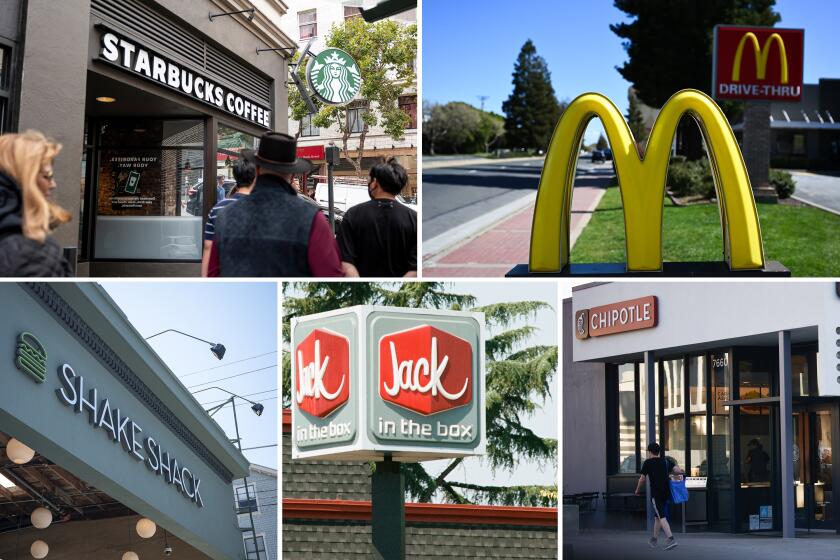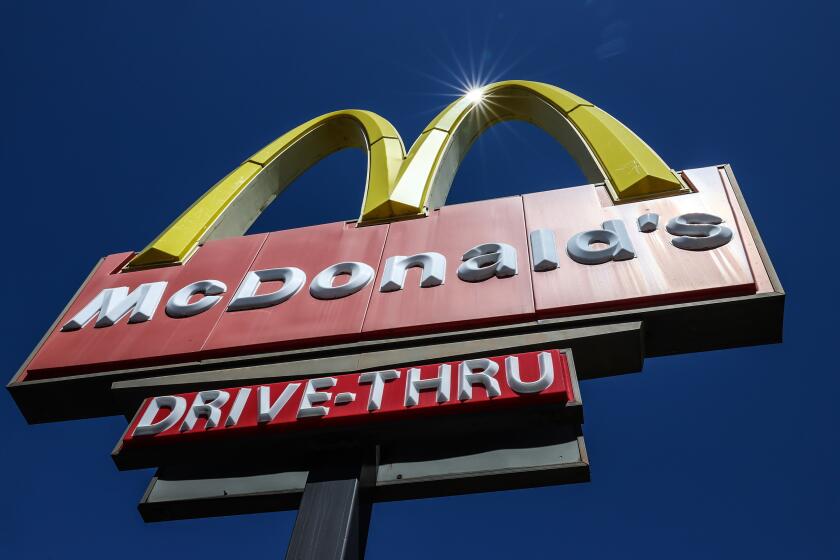Small-business owners brace for uncertainty as $20 hourly fast-food wage takes effect

- Share via
Justin Foronda is the type of creative, motivated, second-generation entrepreneur who should be able to thrive in Los Angeles.
Born and raised in Historic Filipinotown, Foronda opened HiFi Kitchen in 2019 and kept the doors open during the pandemic’s economic disruptions through pure hustle.
Last year the 37-year-old staged a Filipino holiday market across the street from HiFi to draw crowds to the neighborhood. He started a board game night at the store to bring in customers. Next weekend he’s organized a panel of DJs and emcees to discuss the history of Filipinos in hip-hop, and he’s created drink and meal specials for each panelist.
He’s also tried opening a gift shop, selling apparel and doing desserts. He offers new specials almost every week. Foronda also works weekends as a nurse — and ends up floating the restaurant a lot of those earnings.
All that effort has earned him nearly 6,000 followers on Instagram and kept the restaurant open for five years — no small feat given the economic contortions of the last half decade. But with California’s new minimum wage for fast-food workers taking effect this month, Foronda says he’s starting to run out of gas.
He supports a higher minimum wage and tries to pay his employees generously. But the minimum wage is rising so fast that the increased compensation he planned to offer as a retention strategy quickly becomes the new minimum.
With the state’s mandatory minimum wage for fast-food workers set to increase to $20 an hour, many restaurant chains are preparing to raise prices.
“It’s like we’re playing Mario Kart, and we’re just always trying to make it to that boost,” Foronda said.
Small-business owners across Los Angeles are facing a more expensive reality in which the pandemic’s price disruptions have become permanent. Foronda said sometimes eggs are $40 a case, and sometimes they’re $125. So what should he charge for an extra egg?
The new minimum wage is a valuable attempt to rectify the state’s burgeoning income inequality. More money in the hands of fast-food workers — who are more likely to be women, immigrants and minorities — is a good thing.
Fast food is and always has been too cheap. The McDonald’s dollar menu and 50-cent Jack in the Box tacos have become anachronisms in a world where an extra scoop of guacamole at Chipotle costs nearly $3. Fast-food companies have used their dominant position in the labor market to keep wages and prices excessively low, said Michael Reich, a labor economist and professor at UC Berkeley.
“If they increase their prices a bit, the demand for hamburgers isn’t going to fall very much,” Reich said, referring to big fast-food chains.
But the new fast-food wage changes the labor equation for all small businesses that compete for entry-level workers. A higher fast-food wage exerts upward pressure on all those wages, creating an additional stress for businesses already struggling to pay elevated urban rents. Restaurant and retail shops facing expensive commercial rental rates and increased supply-chain costs must now decide whether to raise prices, and by how much.
“These grassroots businesses are part of the glue that holds communities together, and they’re what give the community an identity,” said Chris Tilly, a labor economics and professor of urban planning at UCLA. “A Starbucks just does not play the same role.”
Letters to the Editor: Upset over California’s $20 wage? Wait until you see what fast-food CEOs make
California’s fast-food workers now have a $20 minimum wage. If you think that’s too much, look at what their CEOs make.
At Paul’s Kitchen in downtown Los Angeles, manager Charlie Ng has reduced the storied diner’s hours to save on labor costs. They’re closed on Tuesdays now, and no longer open for dinner hours. They’re staying afloat thanks to some pandemic-related government aid, but Ng’s not sure what to do after that runs out.
Ng raised prices when ingredients got expensive, but he tries to keep the increases under a dollar. Customers have been understanding, Ng said.
“The customers don’t complain about the price right now,” Ng said. “Even they see how expensive everything is becoming,”
Reich, the economist, said the immediate effects of the wage hike will not be extreme because many entry-level jobs already pay more than minimum wage.
But a lot of small businesses, especially those located in high-rent urban areas, can’t afford to absorb any new costs. If we want small, non-chain businesses to be a part of Los Angeles’s future, we have to level the playing field. Individual business owners will continue to lose ground to highly-capitalized real estate interests unless we construct an economy where operating a small business is truly viable. In Berkeley, for example, small businesses have access to a special loan fund and enjoy a simplified permitting process.
A high minimum wage can be a part of that future. More money in the hands of fast-food workers means more spending power in communities and neighborhoods that need it, and more income for local businesses. But someone always has to pay the price for California’s progressive politics, and too often it is minorities, immigrants and wage workers that get the bill.
Meanwhile, Foronda is trying to keep his goals modest. He began the year hoping to make it to February, the restaurant’s five-year anniversary. His new short-term goal is October, Filipino American History Month. If the business has to end then, at least he’ll be able to go out with a bang.
“Five years was always the point in which I was going to step back and take a look at how this fits in my life, how my health is, how my mom’s health is,” Foronda said. “So now we’re here.”
More to Read
Sign up for Essential California
The most important California stories and recommendations in your inbox every morning.
You may occasionally receive promotional content from the Los Angeles Times.
















